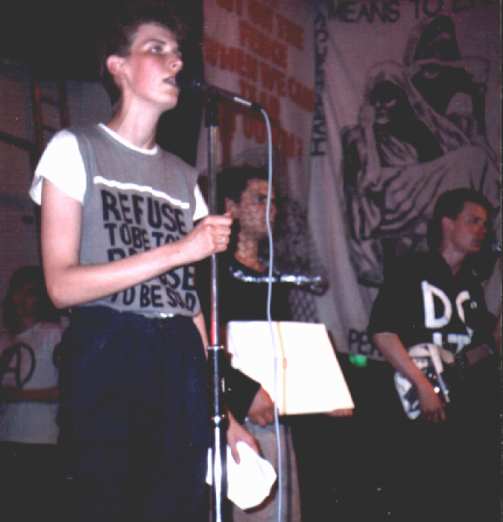Yes, they are the “Tubthumping” band. Yes, they are the “I get knocked down, but I get up again” band. However, it would be a mistake to dismiss them as a one-hit wonder, known only for their massive 1997 hit. They were also an important political band who blended music and activism, who were around way before their blip on the radar hit.
Emerging from the anarcho-punk scene in the early ’80s, Chumbawamba began as a collective of artists and musicians who sought to challenge societal norms. Their name, derived from a fictional village in the Yorkshire Dales, reflects their roots in working-class culture and their desire to represent the underdog. Their early sound was characterized by a DIY ethos, imbued with a sense of urgency. Before their official full-length debut, they released a series of DIY limited quantity (and extremely rare) cassettes.
Their 1986 debut album Pictures of Starving Children Sell Records, encapsulated their raw, unfiltered approach to music and protest. The album title was also a cynical critique of Band Aid and Live Aid (which is also highlighted on the album’s opening track “How to Get Your Band on Television”.
Showing the link between their music and political intent, they rushed the release of their 1987 sophomore album Never Mind the Ballots to coincide with the 1987 United Kingdom general election. The album heavily focuses on dishonest politicians and voter suppression.
Another one of their notable protest albums was their 1994 release Anarchy, which featured one of their more well-known tunes, “Timebomb,” and the anti-homophobia protest tune “Homophobia” (the version used in the music video is different then the album, it is a remix featuring a choir of the Sisters of Perpetual Indulgence members). The album blends catchy melodies with biting critiques of authority and social injustice, stirring listeners to action.
In 1997, they made the controversial move to sign with the major label EMI, which led to the album Tubthumper and, yes, that ubiquitous song that I would be personally happy to never hear again. The band argued that the deal gave them a larger platform, and they never abandoned their ideals. For example, in a 1998 appearance on the Bill Maher TV show Politically Incorrect, band member Alice Nutter encouraged those who couldn’t afford to buy the album to steal it. Also in response to the Labour government’s failure to support the Liverpool Dockworkers’ Strike, when they performed “Tubthumping” at the 1998 BRIT Awards, they modified the lyrics to include “New Labour sold out the dockers, just like they’ll sell out the rest of us.” Later in the show, vocalist Danbert Nobacon poured a jug of water over UK Deputy Prime Minister John Prescott. The band also rejected a $1.5 million offer from Nike to use “Tubthumping” in a World Cup ad.
Even when they did decide to license their music, it was to subvert the system from within. When they accepted $100,00 from General Motors to use their song “Pass It Along” from the album WYSIWYG, they ended up donating it to activist groups who, in turn, launched a protest campaign against the company.
After they left EMI in 2001, they continued to soldier on, releasing their final album in 2010, ABCDEFG. Also, another one of their notable tunes is “Sing About Love” from their 2008 album The Boy Bands Have Won, which has been performed by protest choirs at rallies. It also well describes why the band continues to be committed to socially conscious music.
Chumbawamba stood at the intersection of music and activism, carving out a unique space that challenged societal norms. Their sonic experimentation and dedication to social issues reshaped the landscape of protest music, inspiring generations of artists to use their platforms for social change. With a catalog that reflects their unwavering commitment to activism, Chumbawamba remains a pivotal force in the ongoing fight for justice. Their legacy endures not just in the anthems they created but in the spirit of resilience and defiance that continues to inspire activists and musicians around the world today.


